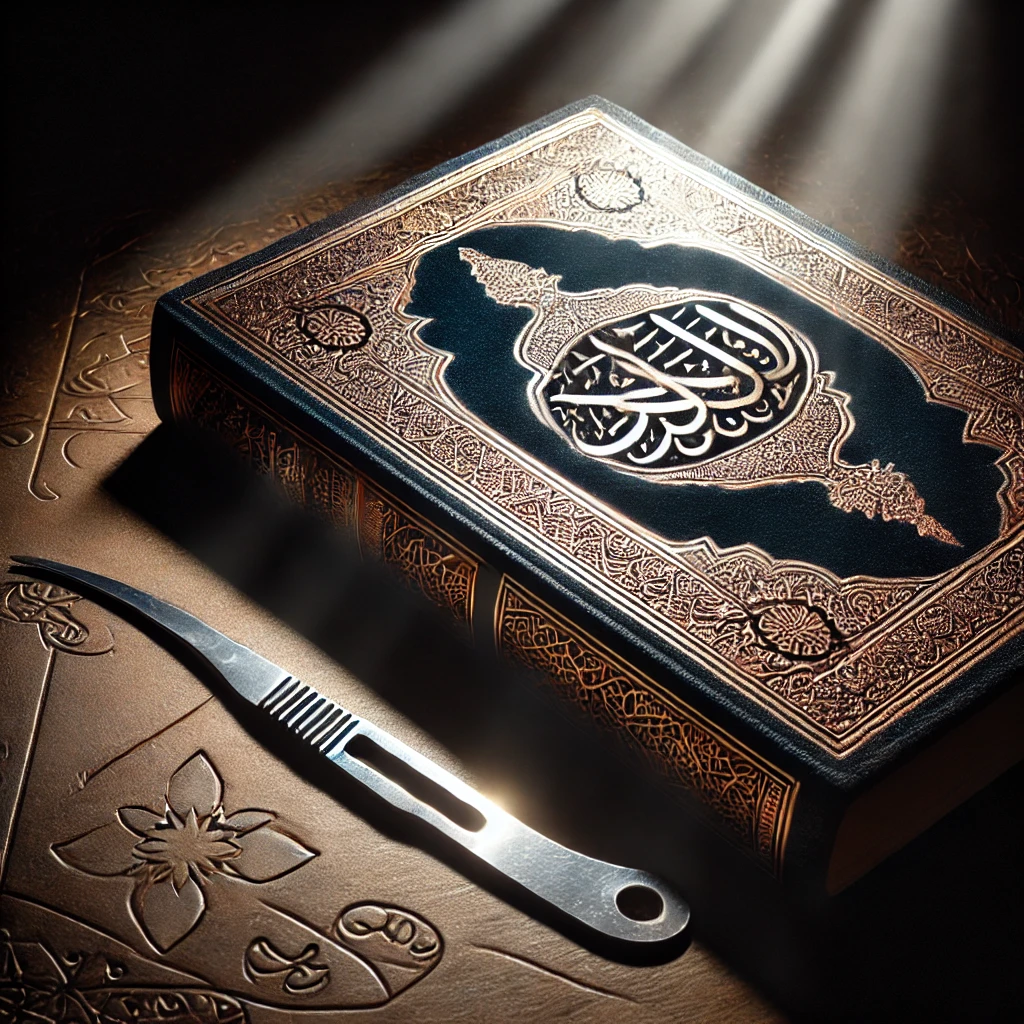Islamic views on circumcision
Islamic views on circumcision
Written By ✌️💚🥑🍌 AvocadoJay23 | AdvocatingAvocado
Islamic teachings on circumcision are not uniform, and while it is commonly practiced among Muslims, there are arguments within Islamic thought that question its necessity and highlight potential harms. Here are some points that challenge circumcision from an Islamic perspective:
1. The Quran Does Not Command Circumcision
• Nowhere in the Quran does Allah explicitly command circumcision.
• The Quran states that Allah’s creation is perfect:
“We have certainly created man in the best of stature.” (Quran 95:4)
• This suggests that altering the body through circumcision is unnecessary.
2. Islam Opposes Body Mutilation
• The Quran warns against altering Allah’s creation under Satan’s influence:
”…and I will command them so they will change the creation of Allah.” (Quran 4:119)
• Some interpret this as forbidding unnecessary body modifications like circumcision.
3. The Prophet Muhammad Did Not Mandate Circumcision for Converts
• Hadiths show that when non-Muslims converted to Islam, the Prophet Muhammad did not require them to be circumcised. If circumcision were obligatory, he would have enforced it.
• Example: A Bedouin man embraced Islam, and the Prophet simply told him to perform wudu and pray—no mention of circumcision.
4. Islam Emphasizes Health and Avoiding Harm (Maqasid al-Shariah)
• The Prophet Muhammad said: “There should be neither harming nor reciprocating harm.” (Sunan Ibn Majah 2341)
• Modern medical studies show circumcision can lead to complications such as infections, loss of sensation, and psychological harm.
• If circumcision causes harm, it contradicts the Islamic principle of preserving health and well-being.
5. Islamic Law (Sharia) Prioritizes Consent
• Circumcision is often performed on infants without their consent.
• Islam emphasizes personal responsibility and choice in religious matters.
• Forcing circumcision on children contradicts the principle that one is only accountable for obligations after reaching maturity (bulugh).
Conclusion
While circumcision is a common tradition in Islam, it is not mandated in the Quran, and there are valid Islamic arguments against it based on principles of bodily integrity, harm prevention, and consent. Some scholars argue that it should be an optional practice rather than a religious requirement.
Here are some references to Islamic scholars, historical debates, and contemporary discussions on circumcision that challenge its necessity and highlight its potential harm:
1. Early Islamic Scholarship and Disagreements
• While many Islamic scholars have historically endorsed circumcision, some classical scholars and jurists did not see it as obligatory.
• Imam Abu Hanifa (founder of the Hanafi school of thought) considered circumcision a Sunnah (recommended) rather than Fard (obligatory). His followers, like Imam Al-Tahawi, also noted that it is not a strict requirement.
• Imam Malik (founder of the Maliki school) held that circumcision was a recommended custom (Sunnah), not a duty.
• Ibn Hazm (10th-century Andalusian scholar) stated that circumcision is not obligatory, arguing that religious obligations must be explicitly stated in the Quran, which circumcision is not.
Key Argument:
• If circumcision were an absolute religious duty, there would be clear Quranic evidencefor it, just as there is for fasting, prayer, and charity. The disagreement among scholars suggests that it is not a fundamental requirement.
2. The Quran and Altering Allah’s Creation
• Sheikh Mustafa Azzam, an Islamic scholar, argues that circumcision may contradict Quran 4:119, where Allah warns against changing His creation:
“And I will command them, and they will change the creation of Allah.”
• Azzam states that circumcision, which permanently removes a natural part of the body, may fall under this category of prohibited bodily alteration.
3. The Prophet’s Example: No Compulsion in Religion
• Dr. Shabbir Ahmed, a contemporary Islamic scholar, argues that Prophet Muhammad never ordered circumcision for converts to Islam.
• Example: A man embraced Islam, and the Prophet simply instructed him to perform wudu and pray—without any mention of circumcision (Abu Dawood 356).
• Since Islam teaches that there is no compulsion in religion (Quran 2:256), forcing circumcision contradicts this principle.
4. Medical and Ethical Concerns in Islam
• Dr. Ghulam Nabi, an Islamic medical scholar, argues that circumcision violates the Islamic principle of ‘Do No Harm’ (لا ضرر ولا ضرار), based on the Hadith:
“There should be neither harming nor reciprocating harm.” (Sunan Ibn Majah 2341)
• Nabi notes that modern studies show circumcision:
• Reduces sexual sensitivity
• Can lead to medical complications (bleeding, infections, scarring)
• Causes unnecessary pain and suffering
• Since Islam values health and well-being, any practice causing harm without necessity should be reconsidered.
5. The Right to Bodily Autonomy in Islamic Law
• Dr. Amina Wadud, an Islamic feminist scholar, highlights that Islam emphasizes consent and bodily integrity.
• Islam recognizes that religious obligations apply only after puberty (bulugh), meaning a child should have the right to choose circumcision or not.
• Forcing circumcision on infants violates their right to bodily integrity, which is an important principle in Islamic ethics.
Conclusion: A Growing Debate
• While circumcision is a widespread tradition in Islam, it is not explicitly commanded in the Quran.
• Historical scholars (Abu Hanifa, Malik, Ibn Hazm) questioned its necessity, and modern scholars (Dr. Shabbir Ahmed, Dr. Ghulam Nabi, Dr. Amina Wadud) argue it may contradict Islamic principles of health, bodily integrity, and consent.
• Alternative views within Islam suggest that circumcision should be a personal choice, not a religious obligation.
-𝑨𝒗𝒐𝒄𝒂𝒅𝒐𝑱𝒂𝒚𝟐𝟑 ✌️💚🥑
- 𝑨𝒅𝒗𝒐𝒄𝒂𝒕𝒊𝒏𝒈𝑨𝒗𝒐𝒄𝒂𝒅𝒐 ✌️💚🥑🍌
Honor Your Body’s Design.
“Honor Your Body’s Design—Islam Respects Bodily Integrity.”
#IslamicIntact
#NoQuranicCommand
#BodilyIntegrityInIslam
#CircumcisionDebate
#IslamAndConsent
#NoCompulsionInReligion
#QuranicGuidance
#SunnahNotFard
#MaqasidShariah
#DoNoHarm
#IslamicEthics
#QuestionCircumcision
#ReligiousAutonomy
#MuslimIntactivist
#ProtectInnocence

📢 Want to Know the Truth?
👉 Watch Now: The Truth About Circumcision
Eric Clopper’s explosive, eye-opening presentation exposes the hidden truths about circumcision, its impact on men’s health, and the medical industry’s role in promoting it. If you care about bodily autonomy and human rights, this is a must-watch.
🔗 Sex & Circumcision: An American Love Story – Eric Clopper
🔗 https://youtu.be/FCuy163srRc?si=-I0uSf9MEV06bvY9
Comments
Post a Comment